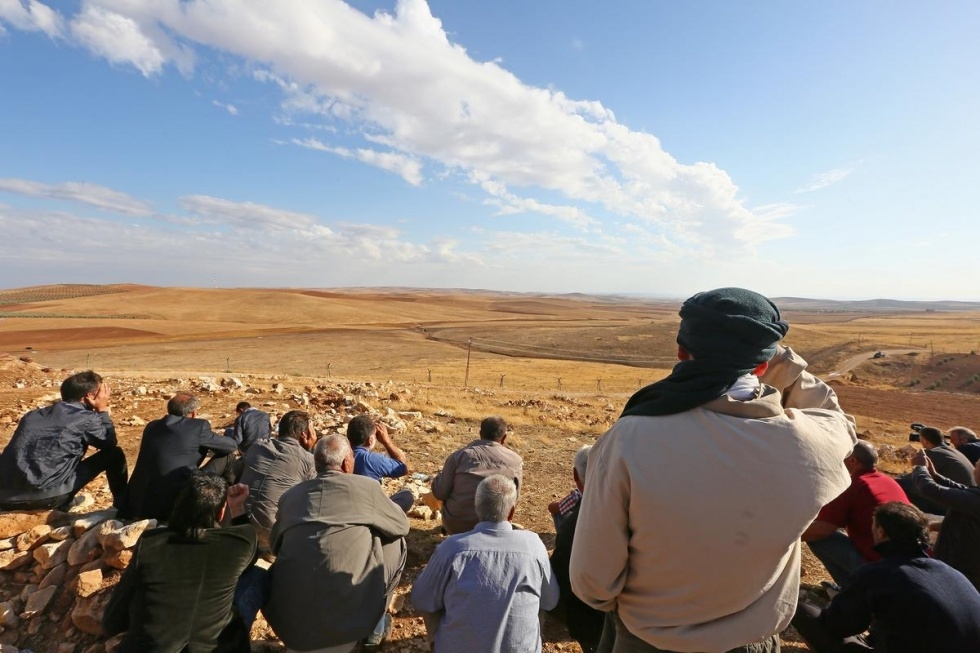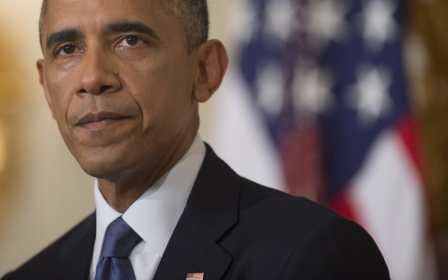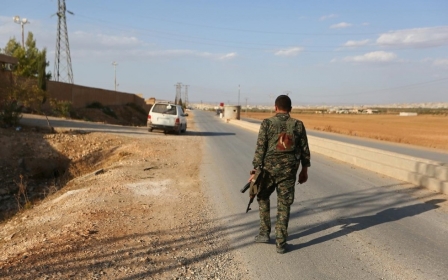Obama: US 'underestimated' threat posed by Islamic State in Syria

President Barack Obama admitted Sunday that the United States underestimated the threat posed by Islamic State fighters in Syria, as US-led coalition warplanes pounded the oil sites that fund the militant group.
Late Sunday, coalition planes hit the entrance to the country's main gas plant in Deir Ezzor, in an apparent warning to Islamic State militants to abandon the premises under their control, a monitor said. The group has reportedly been able to smuggle thousands of barrels of crude oil on to the black market to private buyers in Turkey and Iraq after seizing several oil fields in Syria last year.
Up until Sunday, the strikes had targeted IS bases and makeshift oil refineries used by the militants, in a bid to weaken one of their main sources of financing.
While the Syrian government has welcomed the US-led airstrikes, MEE contributors reporting from Syria's two major cities - Aleppo and Damascus - have said that the majority of Syrians with whom they have spoken condemn the attacks on their country.
“We have become everyone’s playground,” Ammar, a government supporter from Aleppo told MEE. “Once our nation was a big player in the Middle East, now even tiny nations can bomb us.”
In his explosive interview with CBS News broadcast in the US on Sunday night, Obama reviewed US strategy in the fight against Islamic State so far, tackling key issues like US intelligence failures, the future of President Bashar al-Assad and the US role in arming the moderate Syrian opposition.
Critically, he said that former al-Qaeda fighters driven from Iraq by US and local forces had been able to gather in Syria to form the newly dangerous Islamic State group.
Here is a summary of the key points from the interview:
On how IS became such a threat
Obama told his interviewer, Steve Kroft, that the US had “underestimated” the events in Syria and the effect they would have on security in the region.
· Our head of the intelligence community, Jim Clapper, has acknowledged that…they underestimated what had been taking place in Syria.”
· Islamic State now has “some of the strategy and tactics of an army”
· “When we left [Iraq], we had left them a democracy that was intact, a military that was well-equipped, and the ability then to chart their own course. [But] that opportunity was squandered over the course of five years or so because the Prime Minister, Maliki, was much more interested in consolidating his Shiite base.”
· He praised the new Iraqi Prime Minister, Haidar al-Abadi, but stressed that he has a “great challenge” ahead of him in establishing unity and strengthening the Iraqi armed forces.
On arming the Syrian opposition
Speaking about US strategy in the fight against IS in general, Obama highlighted the fact that US airstrikes in Iraq are assisting the Iraqi army in a “very real battle” against the group on their soil.
However, he did not mention who US airstrikes in Syria are supporting, and warned that the situation in Syria is “more challenging, because the US has few viable allies on the ground there.”
· Rebels considered moderate by the US are in control of little territory in Syria, “squeezed between ISIL on the one hand and the Assad regime on the other.”
· The US-led coalition is “hoping to train 5,000 moderate Syrian fighters in Saudi Arabia.” His comments came after the US Chief of Staff, General Martin Dempsey, told a briefing in Washington on Friday that the “ground component” of the fight against IS will require the participation of “12-15,000” Syrian rebels.
· Obama decried the “mythology that's evolved that somehow if we had given those folks some guns two and a half years ago, that Syria would be fine.”
· “For us to just go blind on [arming unvetted rebels] would have been counterproductive and would not have helped the situation. But [it] also would have committed us to a much more significant role inside of Syria.”
On other militant groups in the region
President Obama told his interviewer that the US-led campaign against al-Qaeda had managed to render its structure “ineffective.”
However, he highlighted the threat posed by the Khorasan group, an al-Qaeda affiliated cell thought to be active in Syria, which he fears represents an “immediate” threat to the US.
· Obama said he has warned consistently over the last two years of the growth of these kinds of “regional groups with regional ambitions and territorial ambitions.”
· He dubbed “ideologically driven extremism...in the Muslim world…a cancer that has grown for too long.”
· “In a whole bunch of different countries, radical groups may spring up, particularly in countries that are still relatively fragile.”
· However, he cautioned against the temptation to “play whack-a-mole and send US troops wherever [extremism] occurs.”
On priorities in Syria
US-led airstrikes have struck not just Islamic State targets but also sites held by groups like al-Nusra Front and Ahrar al-Sham, who have been fighting Syrian President Bashar al-Assad.
· Obama rejected the interviewer’s suggestion that “the beneficiary [of US strikes in Syria] is Assad”, calling the situation in Syria “a contradictory circumstance.”
· He stressed US opposition to Assad remaining president in a country in which “Sunni areas…view [him] as having carried out terrible atrocities.”
· However, he said that “in terms of immediate threats to the United States”, IS and groups like Khorasan were the priority.
· According to Obama, Assad’s government and extremism in Syria are “all connected, but there’s a more immediate concern that has to be dealt with.”
Reactions in the Arabic press
Obama’s admission of the US intelligence failure to estimate the size and reach of Islamic State grabbed the headlines in much of the Arabic press on Monday morning.
Many of the pan-Arab newspapers, including al-Jazeera and al-Arabiya, as well as a number of leading local publications, led with Obama’s acknowledgement that his intelligence services had failed to quantify the threat caused by militants in Iraq and Syria.
One regional news hub, al-Hayat, made no mention of Obama’s discussion of the anti-IS campaign, instead highlighting his comments about domestic politics, in which he told his interviewer on 60 Minutes that he is hopeful that the Democrats will be able to take control of the Senate during upcoming midterm elections.
However, a number of leading news sites, including London-based pan-Arab daily al-Sharq al-Awsat, did not mention Obama’s interview at all.
Although the US intelligence failure was a feature of Arabic press coverage of the interview, Obama’s comments on sectarianism also made the front-page of a number of local news sites.
A number of Iraqi and Egyptian news sites quoted Obama as saying that there must be “accommodation between Sunni and Shia populations that right now are the biggest cause of conflict…in the world.”
Troops on ground?
Obama's speech comes as a NBC poll revealed that 72 percent of Americans believed that US combat troops would eventually end up being deployed to fight IS.
The White House has repeatedly insisted that the US will not send troops to fight against Islamic State and seemed to backtrack after comments from General Martin Dempsey, the chairman of the US Joint Chiefs of Staff, who told a Congressional committee two weeks ago that US troops might be required at some point.
However, in remarks from the Pentagon on Friday, Dempsey said he stood by his comments, this time without administration backtrack.
"If you are asking me, would I provide my best military advice at all times the answer is absolutely," Dempsey said, sitting next to US Secretary of Defense Chuck Hagel. "If you are suggesting that at some point, I might recommend we need a big ground force to fight ISIL, the answer is also absolutely."
He added, "The only truly effective force to reduce ISIL is a force comprised of Iraqi and Kurds and moderate Syrian opposition. At some point, if we have to advise them more closely than we currently are, of course, I would recommend that. I just stand by the statement . . . the president gave me a mission - destroy ISIL - and I will do what it takes to destroy ISIL."
After Dempsey's comments, Hagel - one of several US officials who appeared to distance themselves from Dempsey's original 'boots on ground' comments - said, "In all the meetings I’ve been in for past one and a half years, the president and I have made it clear that he expects the absolute most direct and honest military advice that Dempsey and other military leaders have given. He must get it and he relies on it."
According to the Syrian Observatory for Human Rights, air strikes in Syria since 23 September have killed at least 167 militants and 19 civilians, including among them five children and four women.
The presumed head of the al-Qaeda offshoot Khorasan Group, Muhsin al-Fadhli, and another Khorasan leader, Abu Yusuf al-Turki, are reportedly among those who have been killed.
Iraqi security sources said the IS military leader in Fallujah, Mullah Jassem Mohammed Hamad, was killed on Sunday in the group's attack on Amriyat al-Fallujah.
At least 160,000 residents in northern Syria in or near the town of Kobane - also called Ain al-Arab - where IS and Kurdish forces have continued to clash for several days have fled for Turkey.
Middle East Eye propose une couverture et une analyse indépendantes et incomparables du Moyen-Orient, de l’Afrique du Nord et d’autres régions du monde. Pour en savoir plus sur la reprise de ce contenu et les frais qui s’appliquent, veuillez remplir ce formulaire [en anglais]. Pour en savoir plus sur MEE, cliquez ici [en anglais].




